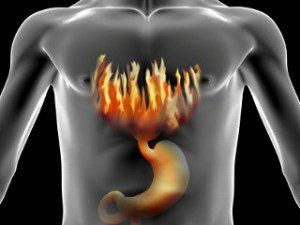Natural Remedies for Heartburn
 14th April 2012
14th April 2012By Jordan & Kyla Miller
Contributing Writers for Wake Up World
Heartburn
is a burning sensation we often feel in our stomach and /or chest.
Symptoms sometimes include bloating, gas, nausea, shortness of breath,
and/or an acidic or sour taste in the throat and mouth. Regular or
constant heartburn is a common symptom of gastroesophageal reflux disease (GERD).
With
GERD, the acidic contents of the stomach flows back into your
esophagus, which can irritate the delicate lining of the esophagus and
cause pain. Heartburn (acid reflux) affects more than 60 million
American adults at least once a month; 25 million of which, suffer from
it daily. Based on these figures, it is quite obvious that we have a
real epidemic on our hands.
Does
it have any correlation with the food we are eating today? We will let
you be the judge. The good news is that most of the symptoms associated
with heartburn can be treated naturally, or can be eliminated entirely
through diet adjustment. Like many illnesses and diseases, heartburn
does not happen to us without reason, it is directly related to what we
put into our mouth, how often we move, and what we are thinking.
You see, all the things that manifest in our lives are the direct result of our actions. If we take a look at our eating habits,
we can often draw parallels with the food we are eating in relation to
the illness that has suddenly manifested. With this knowledge, we can
completely reverse the illness by eliminating the foods that
have directly caused it. In theory this is a rather simple idea,
however in practice, it is difficult for some to completely change their
eating habits. In an effort to help you with the transition, we have
listed blow some great natural remedies you can use today.
Natural Remedies
Herbal Remedies:
- Aloe Vera juice aids healing of the intestinal tract.
- Catnip, fennel, ginger, marchmallow root, and papaya tea all aid in proper digestion and act as buffers to stop heartburn.
- Drinking Chamomile tea can relieve esophageal irritation. (Caution: Do not use Chamomile if allergic to ragweed, during pregnancy, or nursing. It may also interact with warfarin or cyclosporine, so patients using these drugs should avoid it)
- Deglycyrrhizinated licorice (DGL) has effectively treated both heartburn and ulcers of the stomach and esophagus. (Caution: Licorice root should not be used during pregnancy or nursing)
Recommendations:
- At the first sign of heartburn, drink a glass of spring or distilled water. This often helps.
- Try raw potato juice. Do not peel the potato, just wash it and put it in the juicer. Mix the juice with an equal amount of water. Drink it immediately after preparation, three times a day.
- Try drinking a glass of fresh cabbage or celery juice everyday.
- Change your eating habits. Eat more raw vegetables. Eat smaller, more frequent meals. Chew your food well. Eat slowly and enjoy your food.
- Sip 1 tablespoon of raw, organic, apple cider vinegar ( or 1 fresh squeezed lemon), mixed with a glass of water, while eating a meal. This will help boost the HCI in your stomach, as heartburn is usually attributed to low HCI levels. Do not drink any other liquids with meals. (Note: Heartburn can also be attributed to high HCl levels. Please see below for more details)
- Eat fresh papaya and/or pineapple to aid digestion. Chew a few of the papaya seeds as well.
- Do not eat for three hours before bedtime. Wait at least 3 hours after eating before lying down.
- Acid forming foods should be reduced.
- Do not consume caffeine-containing products, carbonated beverages, creamy cheeses, desserts, eggnog, fats, fried foods, gravies, rich sauces, marbled meats, onions (especially raw), peppermint, poultry skin, processed, foods, spearmint, spicy or highly seasoned foods, sugar, tobacco, or tomatoes. These foods have been linked to aggravating symptoms of heartburn.
- Avoid overeating at a meal.
- If you are overweight, weight loss may help reduce symptoms.
- Maintain an exercise program that includes walking, biking, or low-impact, aerobics. Avoid running and heavy weightlifting, as these activities put pressure on the stomach.
- Elevate the head of your bed.
- As much as possible, avoid stress and anger.
- Do not wear clothes that fit tightly around the waist. Do not wear tight clothing to bed.
Other Considerations:
- Estrogens can weaken the esophageal hiatus muscle, which keeps the stomach acids in the stomach. Women who are pregnant, and woman who take birth control pills that contain synthetic estrogen, are therefore more likely to suffer from heartburn. This does not take into account all other forms of synthetic estrogens such as BPA, phthalates, commercial pesticides and the like. If at all possible, avoid exposing your body to synthetic forms of estrogen. For more information on balancing your hormones, click here.
- Some nutrients such as melatonin, L-tryptophan, vitamins B6 and B12, folic acid, methionine, and betaine were shown to be just as effective as drug therapy in reducing symptoms.
- People with certain illnesses, such as cancer, often have excessive amounts of acid in their systems. The consumption of too much processed and cooked foods can also create an acidic environment in the body and affect optimal digestion.
- Aspirin and ibuprofen can cause heartburn.
- Lying on your left side can help relieve heartburn. This keeps the stomach below the esophagus, helping to alleviate heartburn symptoms.
- Antacids often provide relief of symptoms. However, in doing so, they mask an underlying problem. In addition, many over-the-counter antacids contain excessive amounts of sodium, aluminum, calcium, and magnesium. With prolonged use of these products, dangerous mineral imbalances can occur. Excess sodium can aggravate hypertension (high blood pressure), and excess aluminum has been implicated in Alzheimer’s disease.
Essentially,
there are two main contributing factors to heartburn. One being an
overactive stomach, in which case there is an over production of
Hydrochloric Acid (HCl). However, this is far less common than the
second contributing factor of an under-active stomach. An under active
stomach means that there is a lower production of (HCl).
HCl
is needed to digest food properly. When HCl is low, it takes longer for
food to digest leaving food to rot in the stomach. As a result, gases
form and escape up into the esophagus, causing symptoms of heartburn.
A
simple way to test if you have low HCl is by drinking apple cider
vinegar and water before a meal. If your symptoms of heartburn are
alleviated, this indicates that you have lower levels of HCl, and
require HCl supplementation. On the other hand, if you experience a
burning sensation, this indicates excess HCl and an overactive stomach.
In this case, it is important to eat smaller meals, and avoid
aggravaters such as spices, tomatoes, alcohol, caffeine, nicotine,
acids, etc.
You know your body best. By determine what is causing your symptoms of heartburn, you will then be in a better position to alleviate your symptoms naturally.
Source: http://wakeup-world.com/2012/04/14/natural-remedies-for-heartburn/
You know your body best. By determine what is causing your symptoms of heartburn, you will then be in a better position to alleviate your symptoms naturally.
Source: http://wakeup-world.com/2012/04/14/natural-remedies-for-heartburn/

No comments:
Post a Comment